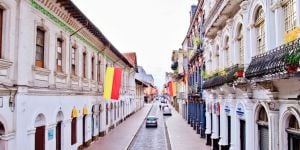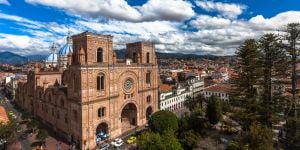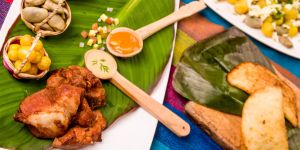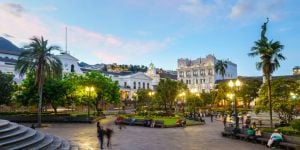Is food really that expensive?
Last activity 06 April 2015 by cccmedia
4940 Views
18 replies
Subscribe to the topic
Post new topic
Hi everybody, this is my first post. I've read a ton of the topics on here and have found them to be extremely valuable!
Just one question, though:
My sister's husband is from Ecuador and she was telling me last night that although housing (rent) is very inexpensive (around $300 for a nice place in Cuenca), food is very expensive. She specifically mentioned that a whole chicken was $6.00 when she was there a year or so ago.
Is this accurate? Do you find groceries to be as expensive as what you would get in the States, or even more expensive?
I would greatly appreciate any input, thanks!
I was there for 3.5 weeks in November. I looked closely at food prices to guage what we would spend monthly. Chicken is more expensive than in US. But not by much. The roasted chickens in stores are about $6-10, on the street they are about the same. Pork is cheaper. They eat a lot of pork there. Beef about the same. Most restaurants are cheaper than US, but the US style restaurants are not. American brands are more expensive in stores. I tried some of the mayo and ketsup and didnt care for it. You can get Kraft mayo in Supermaxi, but not Miracle whip. We ordered packets online of ketsup (Hunts) and Miracle whip as we plan on ordering sandwiches without the condiments they provide. You can get these through companies online in US and bring with you. Cokes, and most other things are readily available at simular prices in US. But no regular Cheetos were found by me anywhere. You can get liquor cheaply but not American Brands or big label brands unless you have deep pockets. Jack Daniels, about 60 bucks a fifth. But they have alternatives. There are meat markets where the food looks clean and doesnt smell, and there are the mercados that have the meat in the open air market, for a cheaper price. Vegetables are cheaper than the US. KFC is a pitiful copy of the US franchise. I tried eating the chicken twice at the one by the airport. Dont taste right. You can get charred wood at the Supermaxi or the big Carbon place on the Americas Ave, on the west side of town for your bbq. Not much to pick from in the outdoor furniture dept. I was going to buy 4 folding chairs, table, and umbrella at Kiwi for $249 on Monday, went back to purchase on Wednesday it was $329. It is still there. Thats one helluva price hike.
Do not rent a place sight unseen. Some of the pictures look great but you have to take into consideration the noise on the street, neighbors with small children, etc.... Take your time, and just because it is in walking distance to lots of places, dont make it a great place to live. We opted to live outside the city, we are country people and can take a bus or cab into town whenever we want. The place we have is 60 yards from a river and very peaceful and green. Bus stop is 200 yards away. So dont just look at one place and dive in. Get a feel of the place first.
Thanks a lot, Txs, what a great response! Very informative.
Yeah, I'm thinking we won't be saving a lot food-wise, but oh well.
Speaking of living outside the city, we are seriously considering living in Paute and taking a trip into Cuenca when we need to buy appliances, certain foods, or for touristy stuff.
We've never set foot in Ecuador yet, but we're planning a recon trip sometime in April, with a move date sometime in July/August.
Is Paute similar to Cuenca as far as quality of housing?
Again, thanks for your response!
Hello,
Food price is about where you buy it. Many American buy at Supermaxi because is similar to North American supermarkets but there's other and cheaper options. You can find other supermarkets, buy in local markets, groceries and so on.
Also you can have a lunch for $2 in many places in Ecuador or get one in elegant restaurants for $20.
Fruits and vegetables are cheaper than in US.
About Paute, is located like an hour from Cuenca an is a small village, if you're looking for a quiet place with good weather it will be OK for you. But no cinemas, hospitals... About housing, there is some relly nice houses from Cuencanos who spend vacation there but in general, housing is not good.
Vinny
If you're a teetotalling vegetarian your food bill will be super-low in Ecuador. Alcohol, imported goods and, yes, chicken are pricey, but most everything else is very reasonable. I'm in the US right now visiting family for the holidays. Pineapples are "on sale" for $3.99--we pay less than $1 at home in Cuenca. I bought a grapefruit for $1.50. Yes, it was beautiful and had no seeds. Ours are ugly and have tons of seeds but cost 18 cents. Go local and save big; keep your American tastes and be prepared to pay.
Thanks for the tips guys. We won't have a problem buying mostly from local markets; we spent a year in Nicaragua and ate mostly that way, except for the occasional U.S. craving. Although we did find most Nicaraguan food to be rather bland and tasteless. We are hearing that Ecuadorian food is delicious; we are looking forward to it!
Thanks again!
A couple more things you might want to know.
Large appliances are about 10-20% higher there. TV's are about 30% higher. Directv is about the same, but less US channels. You can get insurance at Santa Inez hospital in Cuenca for less than $100 a month for both of you if you are under 65. Cabs are normally $2 for a 5-10 minute ride, after that you gotta dicker. Most cabbies charge $10 an hour for sightseeing or whatever you need. If you dont speak spanish make sure you get a name and phone number of someone who does. I have a couple and they are very nice people, and very helpful. As for the local food be careful where you eat. I have been advised by more than one person that some places do not have very sanitary habits. So keep a dose of plug up, and settle down medicine handy if you are adventurous. I got Montezumas revenge twice in 3 weeks while there. I walked a little on the wild side, and paid for it. And buy soft toilet paper just in case. I figure I can live comfortably with rent, elect, gas, water, internet, groceries, eating out 3 times a week, my nightly tottie, taxi and bus fees, and entertainment for $1700 a month. You can live cheaper, or higher. Depends on how much you want to localize. I am spoiled. And there are some things I dont mind paying extra for. You just gotta find your own sweet spot. One thing I can tell you though. If the space shuttle ever needs a new tight cover they need to order one from Cuenca. The girls and women there can fit a size 10 body in a pair of size 2 pantsuit. Not like in the US. The girls there dont mind a little muffin top. And most were pretty as could be and always dressed very nice. Was nice to see ladies without sweat pants and baggy T shirts everywhere. When they go out they are dressed well. Even wearing high heels on the ragged sidewalks. I had trouble not tripping wearing tennis shoes!
Txsbigfoot, Is your $1,700 for you alone or for you and a spouse? Thanks.
Thats for 2 people. As I said a lot of it depends on where and how you live. You can eat the daily lunch specials for chicken feed. But if you spring for a place like Bananas you will spend close to US prices. And if you live in the city you can walk most places, thus saving taxi money. I like my space. And dont like being feeling crowded, thus I chose to spend a little more for transortation for my lifestyle. I can see where you could live on $1200 a month being frugal and living in town. But we have pets that are walked at least 3 miles everyday in the woods near our house. And we enjoy that lifestyle. And it is available just outside of town.
Bigfoot, we are trying to decipher your monthly budget, which you said includes your nightly tottie.
At urbandictionary.com, a tottie is either "a good drink to have before bed" consisting of tea, lemon, honey and 2 ounces of bourbon...or "a good looking teenage girl, especially one that is a tease or dressed to look older."
Wondering which of these nocturnal ofertas is included in your $1,700 per month budget....
. Luis, we can relate to those occasional foreign-food cravings you mention.
Along these lines, I found my most recent visit this week to a MegaMaxi in Quito to be like the name of the Peruvian lake Titicaca -- half good, half bad.
The good news is that food products missing since at least February are re-appearing on the supermarket shelves.
I had been looking without success for my favorite cereal, Kelloggs Muesli, for months at MegaMaxi and around town. The Maxi store manager indicated that high tariffs on U.S. products was the reason for its absence, but that the product would be back. Now it is. Actually, they had only one of the fruity Kelloggs Muesli flavors, melacoton. No sign of the apple or the arandano (cranberry).
Also, MegaMaxi's previously poor selection of mustards has been markedly improved. Until this week your choice was essentially between the boring, standard Ecuadorian brands and a low-grade dijon. This week I was delighted to encounter two terrific new mustards under the imported Maillot brand -- Dijon Originale and "A l'Ancienne."
The bad news included the MegaMaxi computer "linea" being down, preventing me from using my Visa debit card. Within view of scores of shoppers, I had to empty the various pockets where I divide my cash for security reasons, along with pulling out my secret inner pouch -- in order to put together the $201 in efectivo needed to complete the purchase. Fortunately, any ladrones-delincuentes-padillas either were not around or weren't paying attention, as the cash collection and transaction were completed without incident.
The other problem involved getting my mercancias from MegaMaxi into a yellow taxi so I could take it home to Centro Historico at that hour, 6 p.m. When the taxistas on the MegaMaxi side of the avenida (headed North, away from Centro) refused to take my fare due to trafico and the rush-hour U-turn challenge, the portero pushing my cart refused to push the cart across to the other side of the street to get a taxi headed South. Against policy, he said. Eventually, I took an unlicensed blue gitano taxi after more than half an hour of waiting. I rarely agree to ride with the gitanos, but the portero swore that my taxista was a "conocido."
TXSBIGFOOT is moving back to the USA end of this month, probably does not care about the improvements in mustard availability.
For me, food is far cheaper, with chicken being the odd exception. I find it cheaper to eat where the taxi drivers and police eat than to buy food and cook at home.
Like another poster said, fruits/vegetables--which is all I buy-- are cheaper. I spend about $150/month and I end throwing about 20% away (mostly due to mold or other abnormalities). If I had to I go lower, I could probably do $100 a month. "Gringo pricing" is another issue that can elevate your grocery bill some 50% or so.
The only other foods I've ever paid attention to are organic canned garbanzo beans which were very expensive at supermaxi. If I remember right, they were close to $4 a can whereas in Trader Joe's in the US it's $1.29 a can .The other food is shelled walnuts. They were $5 for 400 grams (almost a pound) at Tia (which an american styled supermarket like supermaxi), which I thought was a good price.
wlae84 wrote:fruits/vegetables--which is all I buy--are cheaper. I spend about $150/month....If I had to I go lower, I could probably do $100 a month.
A vegetarian can definitely live on a frugal food budget such as this. I know because I shop at Quito's fruit-and-vegetable mercados on a weekly basis.
84 qualifies as one of the rare Gringos occasionally referred to in rumors and Internet promotions who can still live on $800 per month.
Most of us need the occasional hit of camarones a la plancha, or parilladas de carnes to make it through the month.
cccmedia in Quito
Luisr,
I hope that you have considered the possible effects the change in altitude can have on you. We are in our eighth week here in Cuenca doing our elaluation visit. Although my wife adjusted to the elevation in a couple of weeks, I am still having some problems with shortness of breath (20% less oxygen in the air). I have spoken to others who say they feel dizzy and/or have more head aches than usual.
Also, in a later post you say "Although we did find most Nicaraguan food to be rather bland and tasteless. We are hearing that Ecuadorian food is delicious; we are looking forward to it!"
Please, please, please tell me where to find that delicious food. All we have had for two months is the bland tasteless variety. Based on our experience, they use little or no seasonings, and most of the time you have to ask for salt and pepper because it is not on the table. The most common claim I hear about the local food is that it is cheap and plentiful. Rarely do I heard the word delicious in the same sentence. If we had a house or apartment here with a full kitchen and we could prepare our own meals spiced (assuming you can even locate the right spices) way we like them, we could adjust easier but there are too many "ifs" for us to decide to move here. Just my two cents!
I found many of the foods in Ecuador to be tasty -- some less so, some more. Restaurants almost always have spices on the table that one can use as needed. Aji is great -- not as hot as most Mexican hot sauces, but very flavorful. If a restaurant doesn't have a bowl of aji on the table (most do), just ask for it.
BobH wrote:I found many of the foods in Ecuador to be tasty -- some less so, some more. Restaurants almost always have spices on the table that one can use as needed. Aji is great -- not as hot as most Mexican hot sauces, but very flavorful. If a restaurant doesn't have a bowl of aji on the table (most do), just ask for it.
I've become an aji addict and it tends to be so different from one region to another, sometimes using a tree tomatoe base, sometimes, the cacao pulp, and on the n coast that dangerous combination of vinigar and dragon peppers.
"We are hearing that Ecuadorian food is delicious. We are looking forward to it," Luis R. of Chicago posted above on this thread.
Ecuadorian cuisine is not as famous worldwide as Chinese, Italian, Thai and Mexican. But for folks living in some major U.S. cities, there's the chance to try Ecuadorian fare without a passport, before becoming an Expat.
The New York Times just wrote up an Ecuadorian restaurant in its own backyard named Ecuatoriana on Amsterdam Avenue between 143rd and 144th streets near the Hudson River.
"Under a forest-green awning two storefronts long...lies a well-lit, high-ceilinged space of two rooms conjoined by a brick archway. Ceiling fans turn the aromas drifting from a small kitchen into the rooms and beyond the bar, where men sip beer and watch a (televised) soccer match from a sunny place. Latin rhythms jangle from a jukebox."
The signature EC dish ceviche (chilled seafood soup) is on the menu and so is the national "flagship dish" Bandera, literally "flag." It's served as a plate piled with roast meats, salads, rice, tripe and seafood. There are also various soups, including sopa de mariscos, which includes a huge helping of mussels, shrimp, clams and squid.
Part-owner Marcelo Vera, fit and handsome, works the room with a quick smile as he welcomes guests, delivers plates and chats amiably with patrons both familiar and new.
The New York Times, March 27th
Articles to help you in your expat project in Cuenca
 Work in Cuenca
Work in CuencaThere is no doubt that the Spanish colonial city of Cuenca is a wonderful place to call home, as demonstrated by ...
 The Cajas National Park
The Cajas National ParkLas Cajas parque nacional is located about a half hours drive (or hour bus ride) to the west of Cuenca, along the ...
 How to Access Your Money in Ecuador
How to Access Your Money in EcuadorI've noticed that there's a lot of information on the Internet about how Americans access funds from ...
 Accommodation in Cuenca
Accommodation in CuencaThe rose-colored lenses through which potential expats have been made to view Cuenca often blur how the real ...
 Healthcare in Ecuador
Healthcare in EcuadorEcuador, as a fast-developing nation, has laws that are constantly evolving, but one thing is certain: the ongoing ...
 The Working Holiday Visa for Ecuador
The Working Holiday Visa for EcuadorEcuador is truly a paradise for adventure and nature lovers, and thanks to the Working Holiday Visa program, they ...
 Food in Ecuador
Food in EcuadorWhat kind of food will you find in restaurants, cafes, and private homes in Ecuador? Many restaurants in Ecuador ...
 Work in Ecuador
Work in EcuadorEcuador is famous as a retirement haven. But you might not want to wait until retirement age to move there and ...
Find more topics on the Cuenca forum



